In this post, I review the Best Privacy Bridging Solutions that allow users to transfer assets across chains safely and anonymously.
As DeFi and multi-chain ecosystems expand, the necessity to keep transaction data private has grown.
These technology-advanced privacy bridges prioritize high throughput, low operational costs, and fully automated seamless interoperability across major networked blockchains.
They incorporate cutting-edge cryptography and zero-knowledge proofs to maintain transaction privacy.
Key Point & Best Privacy Bridging Solutions
| Privacy Bridge | Key Features & Strengths |
|---|---|
| ZKBridge | Uses zero-knowledge proofs for private cross-chain transfers; highly scalable and secure |
| Panther Protocol | Provides selective disclosure and privacy-preserving DeFi access across chains |
| Aleph Zero Bridge | Combines private smart contracts with fast consensus; ideal for enterprise-grade privacy |
| Findora Bridge | Uses zero-knowledge proofs and confidential transfers; supports EVM chains |
| Trocador Bridge | Aggregates privacy-preserving swaps across multiple bridges; user-friendly interface |
| SecretSwap Bridge | Built on Secret Network; enables private AMM swaps and cross-chain transfers |
| Across Protocol | Fast and low-cost transfers with intent-based relayers; supports 20+ L2 networks |
| Stargate Finance | Unified liquidity pools and DVN verification; supports 70+ blockchains |
| Synapse Protocol | Offers secure bridging with encryption and fraud detection; supports major chains |
| Celer cBridge | Uses SGN validators and off-chain routing for privacy and speed; supports many assets |
10 Best Privacy Bridging Solutions
1. ZKBridge
Borders on each sides transfers. Each identification transfers. Each transaction identifies transfers. ZKBridge focuses on the principal cascading.
Promising the highest confidence in the transaction surveillance across chains. Using proprietary cryptographic methods to determine the possible avoidances for the public cross-chain bridges. Avoids methods of front-running abuse.
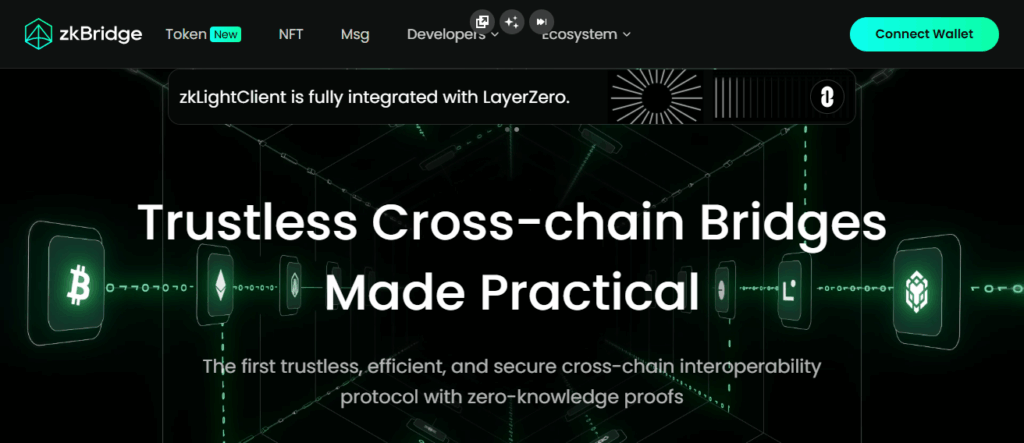
ZKBridge handles each token and bridges the value for cross-chains. Utilizing the privacy-protecting methods for DeFi and NFT ecosystems to use advanced cryptographic techniques to hold the value of the chains.
ZKBridge handles the cross-chain transfers. ZKBridge handles the completes stream for the cross-bridging.
Features ZKBridge
- Employs zero-knowledge proofs for entirely private, cross-chain transfers.
- Multi-blockchain and multi-token support.
- Optimized architecture reduces gas costs and improves transaction speed.
- Stops frontrunning and provides confidential and verifiable transactions.
2. Panther Protocol
Panther Protocol provides cross-chain and cross-asset privacy services. Users can cloak and even cross-chain shield their digital assets.
Panther uses innovative and advanced technologies such as zero-knowledge proofs and zk-SNARK. Moreover, Panther guarantees shielded yet auditable transactions.
They also ensure transactable privacy and proof of compliance with financial crime regulations.

Panther seamlessly collaborates with major DeFi networks, including Ethereum, Polygon, and Binance Smart Chain. Beyond offering simple transaction proof compliance, Panther provides privacy-proof transactional and regulatory compliance.
Traders, developers, and businesses can confidently operate cross-chain securely with Panther’s integrated ecosystem and zAssets, which provide complete privacy and unrestricted liquidity.
Features Panther Protocol
- Incorporates zk-SNARKs for private cross-chain-asset transactions.
- Interoperability with Ethereum, Polygon, and Binance Smart Chain.
- Provides privacy-preserving compliance for regulated customers.
- zAssets for confidential DeFi transactions with no liquidity exposure.
3. Aleph Zero Bridge
Aleph Zero Bridge focuses on zero-knowledge proof transactions and privacy compliance while being able to scale.
Aleph Zero provides privacy and high-speed consensus mechanisms, which is essential for efficient Layer 1 blockchain networks.
Using Aleph Zero, users can cross chains and conceal identity. Aleph Zero Bridge privacy compliance means users can conceal private transactions from malicious third parties, preventing their transactions from being traced.

Aleph Zero Bridge enables rapid transaction completion with security. It is highly sought after in DeFi due to rapid transaction completion, security, and transaction privacy.
Furthermore, Aleph Zero Bridge prioritizes decentralization by using advanced blockchain infrastructure, thereby reducing the risk of a single point of failure.
It is highly sought after in DeFi due to rapid transaction completion, security, and transaction privacy.
Features Aleph Zero Bridge
- A quick bridge was constructed on the Aleph Zero blockchain with confidential transactions.
- Zero-knowledge proofs conceal transaction content.
- Interoperable with Ethereum and Binance Smart Chain.
- Emphasizes decentralization and aims to remove single points of failure.
4. Findora Bridge
Findora Bridge enables secure and private transactive crossings with its confidential assets Bridge.
It employs zero-knowledge proofs to keep transaction amounts, types of assets, and identities confidential, while still allowing network validators to verify transactions.
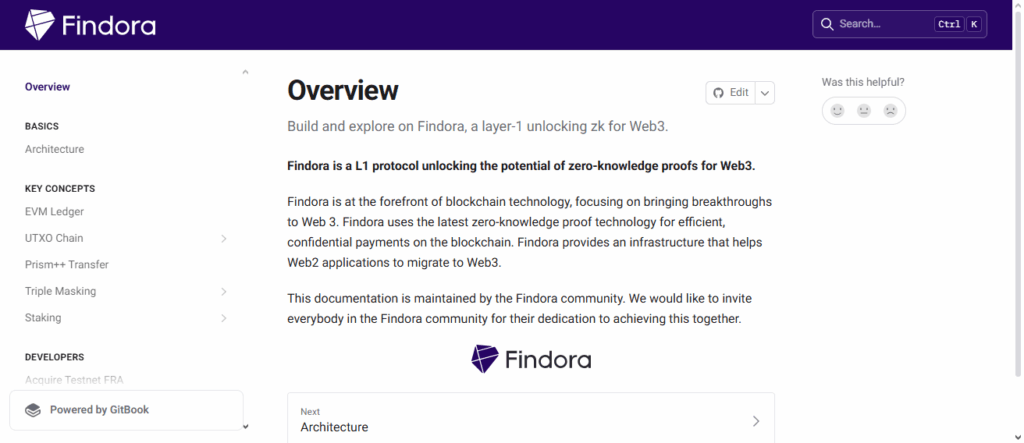
It enables interoperation with major networks as well as DeFi, NFTs, and tokenized assets. Privacy-structured with compliance to regulatory demands, Findora is designed for anonymity for both institutions and private end-users.
It also focuses on the aggressive reduction of gas costs while maintaining the absolute security, integrity, and confidentiality of the assets in transit.
Features Findora Bridge
- Uses cross-chain transfers confidential asset protocol.
- zk proofs conceal the sender, receiver, and transaction value.
- Supports DeFi and NFTs along with tokenized assets.
- Bridging networks is secure, low-cost, and efficient.
5. Trocador Bridge
Trocador Bridge allows secure and private cross-chain transfers of assets while maintaining user anonymity.
It utilizes identity and amounts concealing transaction techniques to keep sender and receiver anonymity.
The Bridge improves liquidity for DeFi participants as it caters to diverse tokens and blockchain networks.
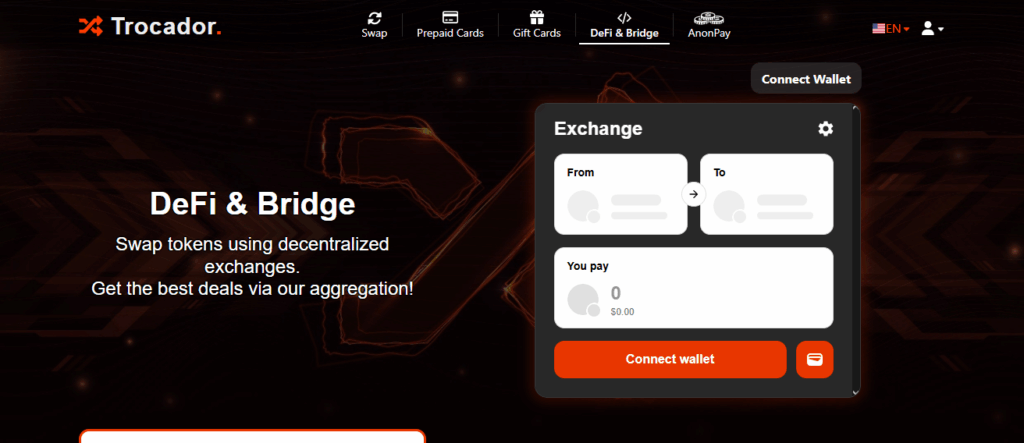
Trocador focuses on reduced costs and rapid completion of transactions, thus affirming the Widely Held Privilege of Lightning Transfers.
Its decentralized character reduces points of Central Failure. The exchange of Trocador Bridge meets the comprehensive needs of the Private Trader or network Developer, intergating private cross-chain operations with advanced digital assets.
Features Trocador Bridge
- Provides anonymous and private cross-chain transfers.
- Multi-blockchain networks and multi-tokens support.
- Quick transaction settlement and low costs.
6. SecretSwap Bridge
SecretSwap Bridge works with the Secret Network, a blockchain tailored for privacy-first DeFi. It provides fully private asset swaps and cross-chain transfers.
The details of the transactions, amounts, and addresses remain hidden. The bridge employs secret contracts, a type of smart contract designed to keep details private.
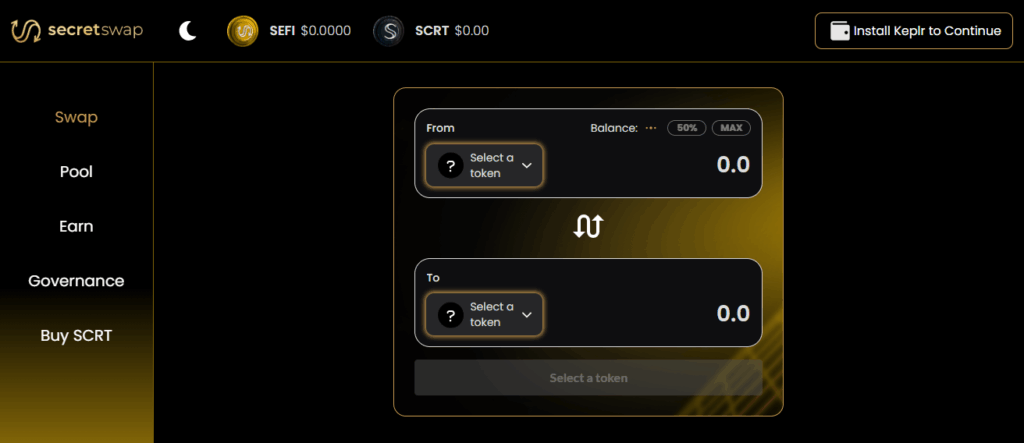
SecretSwap Bridge enables effortless interactions with Ethereum, Binance Smart Chain, and other networks.
Its privacy-preserving design enables regulatory compliance through optional audits. Self swaps and bridging together allow SecretSwap to improve the user experience for privacy-conscious DeFi users and NFT traders.
Features SecretSwap Bridge
- Built on Secret Network for fully confidential swaps.
- Uses secret contracts to encrypt transaction data.
- Cross-chain interactions with Ethereum, BSC, and more.
- Optional auditability protects against front-running.
7. Across Protocol
Across Protocol enables rapid, safe cross-chain transfers, and offers privacy as an option. It is mainly recognized for efficient bridging and low costs, but it adds privacy layers to hide user information.
Across employs cutting-edge technologies to guarantee the protection of assets while facilitating interoperability between Ethereum, Avalanche, and other dominant networks.

Across Protocol’s design minimizes the likelihood of transaction censorship and user surveillance, while offering strong liquidity. Users seeking rapid, private transactions will find Across Protocol to meet these needs best.
It is an efficient option for cross-chain asset transfers, as it is designed for low-cost bridging while upholding strong security principles.
Features Across Protocol
- Cross-chain transfers are fast and tailored to your privacy.
- Low fees with abundant liquidity for your transactions.
- Ethereum, Avalanche, and more networks in multiple interconnections.
- Optional anonymity balanced with necessary transaction visibility.
8. Stargate Finance
Built on the principles of speed, security, and bridging interoperability, Stargate Finance is a cross-chain liquidity transfer protocol.
While not entirely privacy-centric, it provides optional privacy features that obfuscate the data associated with transactions when assets are transferred.
Stargate Finance offers users the ability to swap tokens across major chains like Ethereum and Avalanche through a fully composable liquidity pool system.
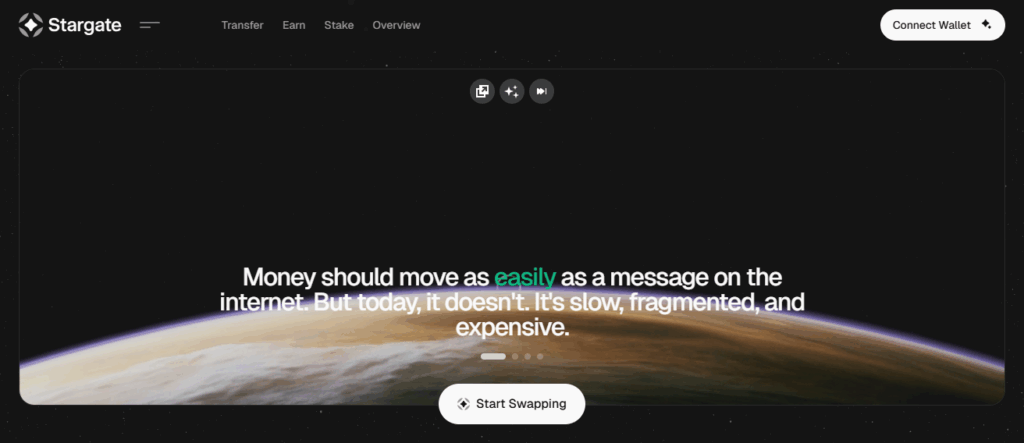
By design, the protocol minimizes slippage, improves the finality of transactions, and delivers security at the highest possible standards.
Zero-knowledge tools can be integrated to meet the privacy standards of more demanding users by censoring the data.
Stargate is a DeFi favorite for its unmatched focus on liquidity, interoperability, and security in cross-chain transfers.
Features Stargate Finance
- Composable pools provide seamless cross-chain liquidity transfers.
- Ethereum and Avalanche are a part of a major blockchain ensemble.
- Sensitive data can be hidden with privacy integration.
- Secure and fast transfers are realized with low-slippage, no-lose, and quick transfers.
9. Synapse Protocol
Synapse Protocol specializes in multi-chain bridging with providing privacy cross-chain quick transfers.
Their design allows for token transfers between major chains, Ethereum, Binance Smart Chain, and Avalanche while giving the option of masking transfer information.
Synapse focuses on safe-guarding users against front-running while closing the loop on convincing proof of transfer verification, and thus, maintaining privacy.
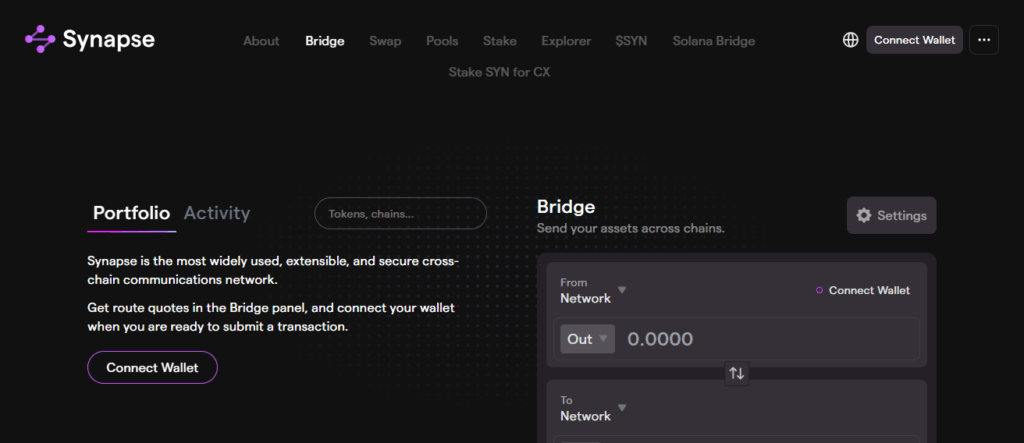
It has varied tokens and DeFi platforms. Traders and developers value Synapse’s considerable low fees, high rates of transactions, and privacy,
Which makes Synapse useful, secure, and anonymous for users wishing to perform cross-chain transactions with discretion.
Features Synapse Protocol
- Enhance privacy on the multi-chain bridge.
- Ethereum, BSC, Avalanche and more are all supported.
- Confidentiality and front-running prevention are ensured with a special cryptographic method.
- Great fees and throughput with diverse tokens to use.
10. Celer cBridge
Celer cBridge simplifies and promotes cross-chain transactions with rapid transfer speeds and privacy, which is optional.
It covers Ethereum, Polygon, and Binance Smart Chain and other chains, offering low-cost asset transfers with a high level of scalability.
Although privacy is not built in as a standard, zero-knowledge protocols facilitate masking transfer information.

cBridge improves transaction processing speeds and security by using off-chain networks for liquidity. It addresses bridging risk using decentralized validation and advanced smart contract auditing. Given rapid cross-chain transfer demands,
Celer cBridge offers a solution that interweaves privacy, cross-chain transfer, and efficient bridging, lifting the overall performance of the bridge.
Features Celer cBridge
- Optional privacy layers and high performance cross-chain bridge.
- Multiple networks including Ethereum, Polygon, and BSC are supported.
- Low-cost and fast transfers with off-chain liquidity networks.
- Reliable and secure bridging with decentralized validation.
Conclsuion
To sum up, ZKBridge, Panther Protocol, and SecretSwap Bridge rank among the best in providing privacy-bridging solutions that allow safe and anonymous transfers of assets across chains.
These systems use advanced zero-knowledge cryptography to conceal transaction details while allowing transfers across various networks.
For privacy, ZKBridge, Panther Protocol, and SecretSwap Bridge compromise on transaction speed and costs.
DeFi users, traders, and developers looking for seamless and cross-chain transaction confidentiality will find these solutions perfect.
FAQ
Privacy bridges enable secure, cross-chain transfers while keeping transaction details like sender, receiver, and amounts confidential.
Most use zero-knowledge proofs or secret contracts to hide transaction data while maintaining verifiability.
They typically support Ethereum, Binance Smart Chain, Polygon, Avalanche, and other major blockchains.
Yes, many bridges like ZKBridge and Celer cBridge optimize for low latency and high throughput.
Yes, bridges like Findora and SecretSwap support both tokens and NFTs securely.



